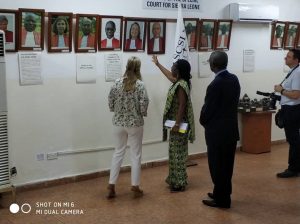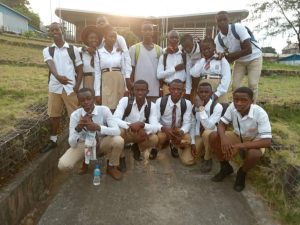What is the Peace Museum?
The Sierra Leone Peace Museum (“Peace Museum”) is a legacy project of the Special Court for Sierra Leone (“Special Court” or “SCSL”) and the Residual Special Court for Sierra Leone. (‘‘Residual Special Court’’ or ‘‘RSCSL’’). The Peace Museum was established to serve as a memorial, research and historical site for both Sierra Leoneans and non-Sierra Leoneans. It contains significant historical documents such as the Special Court Public Archives and the Truth and Reconciliation Commission (TRC) records.
Mission Statement
The Peace Museums’ mission is to collect, preserve and share the history of the war in Sierra Leone and to educate the present and future generations about the fight against impunity, the pursuit of accountability and the importance of sustainable peace.
Start of the Peace Museum
Ahead of wrapping up its work in accordance with its completion strategy, the Special Court for Sierra Leone set out some principal legacy activities which included the National Witness Protection Unit project, the Peace Museum project and the Archiving Development Program. The Peace Museum project was proposed by the Government of Sierra Leone in 2010, as future use of the Special Court site. The purpose of the Peace Museum was to house the SCSL and TRC archives, honor the victims of the war and narrate the story of Sierra Leone’s decade-long armed conflict in the 1990s and its return to peace. In December 2010 the United Nations Peacebuilding Fund approved a grant of $195,000 for the Court to implement the Government’s proposal for a Peace Museum project. The project officially began in March 2011.
In collaboration with the Government of Sierra Leone, national and international partners, the Special Court developed its vision for a memorial into the Peace Museum project. The Peace Museum was designed by the Special Court legacy committee consisting of governmental, national and international stakeholders/institutions including the Attorney-General and Minister of Justice’s Office, the Office of the President of the Republic of Sierra Leone, and civil society groups.
In April 2011, the Special Court hosted the opening ceremony of the Sierra Leone Peace Museum preview exhibition where the initial collection of artifacts was presented. The preview exhibition which lasted three days was organized by the Peace Museum Project Management Team as part of celebrations for Sierra Leone’s 50th Independence Anniversary. Mr. Michael Schulenberg, the Executive Representative of the Secretary-General, represented the United Nations and the United Nations Peacebuilding Commission at the event.
On 2 December 2013, there was a soft opening of the partially completed Peace Museum that allowed staff and visitors to preview the pilot exhibition room. The Peace Museum was located at the Special Court site. The Special Court closed and transitioned to the Residual Special Court on 31 December 2013. The Peace Museum continues to occupy a portion of the former Special Court site and shares the site with other organizations including the Residual Special Court, Western Urban DiCOVERC (the District COVID 19 Emergency Response Center), the Law Reform Commission, the Justice Sector Coordination Office, and the Sierra Leone Law School.
Prior to the Special Court’s closure, the Peace Museum was handed over to the Government of Sierra Leone and the Legacy Committee for further development. At the time of the handing over, the pilot exhibition room (Anteroom) was fully developed, and the foundation of the hut and mini slabs symbolizing graves were constructed at the Memorial Garden. After five years of dilapidation and stagnation of the Peace Museum and the Memorial Garden project, the Residual Special Court took over the Museum in order to preserve the legacy of the Special Court and to protect the Special Court and TRC archives which were housed in the Museum. The Residual Special Court refurbished the Museum and continued with its development and expansion. As part of this undertaking, it redesigned the Peace Museum and Memorial Garden project to make it more cost-effective and respond to the current needs of Sierra Leone.
The Peace Museum is aimed at strengthening people’s historical knowledge and advancing the ability of young Sierra Leoneans to promote a peaceful and just society
Also, as a place where memory is preserved, the Museum contributes to enhancing the culture of human rights and rule of law in Sierra Leone. It achieves this by using the representations of the war to promote an understanding of the need to foster continued peace and reconciliation in Sierra Leone.
After the completion of the initial refurbishment phase and reproduction of the Special Court archives, the Residual Special Court re-opened the refurbished Museum to the public on 10 December 2019. The refurbished Peace Museum was officially re-opened by Sierra Leone’s Minister of Justice and Attorney-General Priscilla Schwartz. In his remarks at this event, Sierra Leone’s Chief Justice Desmond Babatunde Edwards mentioned that a Memorial Garden was also planned for the next phase of developmental work to be embarked on at the Peace Museum. These initial developments were funded by individual donations, the Government of the Netherlands, the Government of Finland and the Sierra Leone National Judiciary.
By September 2020, the RSCSL embarked on a further developmental project of the Peace Museum and Memorial Garden as part of the Preservation and Promotion of the Residual Special Court Legacy project. The project was funded by Global Affairs Canada.
The Peace Museum was expanded and improved, giving context to the written records in various formats and creating a narrative of Sierra Leone’s decade-long armed conflict to help promote human rights and the rule of law in the country. Improvements include the preservation of the Special Court and TRC archives and the conditions of storage of the archives. The expansion includes but not limited to, a) providing basic amenities for visitors to make the Museum a more welcoming place, b) producing a mobile exhibition to reach people in communities and schools in the provinces and rural areas who may not have access to the Museum in Freetown, c) the production of hand held audio tour guides to assist visitors on a self-guided tour of the Museum, and d) increasing exhibition areas and redesigning and developing the long-planned Memorial Garden to promote contemplation of the tragedy of the armed conflict in the 1990s, and remembrance of those who lost their lives.
On 18 January 2022, the Garden was opened and dedicated to the victims of Sierra Leone’s war in a solemn ceremony by Sierra Leone’s Attorney-General and Minister of Justice, the Chief Justice, and the President of the Residual Special Court. The Memorial Garden includes symbolic mass graves for each of the country’s 16 districts, which were unveiled by war victims. The tour and dedication took place as part of the commemoration of the 20th Anniversary of the End of War and the Establishment of Special Court organized by the RSCSL and the Center for International Law and Policy in Africa (CILPA).
On 31 March 2022, the RSCSL completed its “Preservation and Promotion of the Legacy of the Residual Special Court Project” which was initiated in September 2020. Under this project, the RSCSL was able to preserve the public archives of the Special Court (SCSL), making them available and accessible to present and future generations in Sierra Leone, and to visiting researchers from other parts of the world.
To date, the Museum continues to serve as a legacy project of the Special Court and the Residual Special Court. It serves as a centre for the promotion of peace and as a historical and memorial site in honour of the victims of the 11-year armed conflict that took place in Sierra Leone in the 1990s.
Source : SCSL/RSCSL Annual Reports and Newsletters
Peace Museum Exhibitions
The Museum has exhibition areas designed to explain the decade-long war and make the value of peace visible to the people of Sierra Leone.
The exhibition areas tell the stories of the lips that were sealed and evidence of hands that were cut during the Sierra Leone war. It contains other war-related materials and relics of the war, such as artefacts, decommissioned weapons, photos of crime scenes and uniforms, among others. It also has a mobile exhibition, film screening and audio-visual section where historical documentaries and other stories of the war are told electronically.
The Memorial Garden contains symbolic graves and the memorial wall of names dedicated to those who died in the Sierra Leone war.
The Memorial Garden is designed as a solemn place to remember people who died during the war. It is a quiet place for visitors to reflect share their grief and heal. The Memorial Garden also honours the suffering of the war’s survivors and provides a place to contemplate the impact and lessons of the conflict.
The Peace Hall

The Archives Room

The Hallway Artifacts

We are open for events
The Sierra Leone Peace Hall can be rented for events such as Workshops, Symposiums, Graduation Ceremonies, Seminars, Academic, Professional Conferences, Film screenings and Exhibitions among other related events.
The Peace Hall is located in the Sierra Leone Peace Museum. To enquire about the Peace Hall or to rent the Peace Hall, please contact the Peace Hall team:
Tel: +232 79880549, +232 77355749
Email: rentpeacehall@gmail.com
Get Involved
You can collaborate or contribute to the Peace Museum in various ways including:
Sharing names, pictures, clothes, and ID Cards of victims who died or were permanently injured during the war: We are still collecting names and pictures of victims who were deceased as a result of the war. Families and friends are encouraged to contact us for documentation of their loved ones who died during the war. Pictures and names of those who were amputated or permanently injured are also welcomed.
You can get involved by donating to the Peace Museum using the contact details provided in the donation section below. As you may already know, there are a lot of costs associated with maintaining a museum and keeping it open to the public without admission costs. Money donated to the Sierra Leone Peace Museum will be used for repairs and maintenance among other needs that may arise while running the Museum.
States and Organizations that participated in restoring peace to Sierra Leone during the war are invited to send in Artifacts that tell the story of the role they played during the war. We look forward to receiving videos pictures and other items/objects that were used or created during the war.
For further inquiries about how you can get involved, please contact us via email using Email: info@rscsl.org










